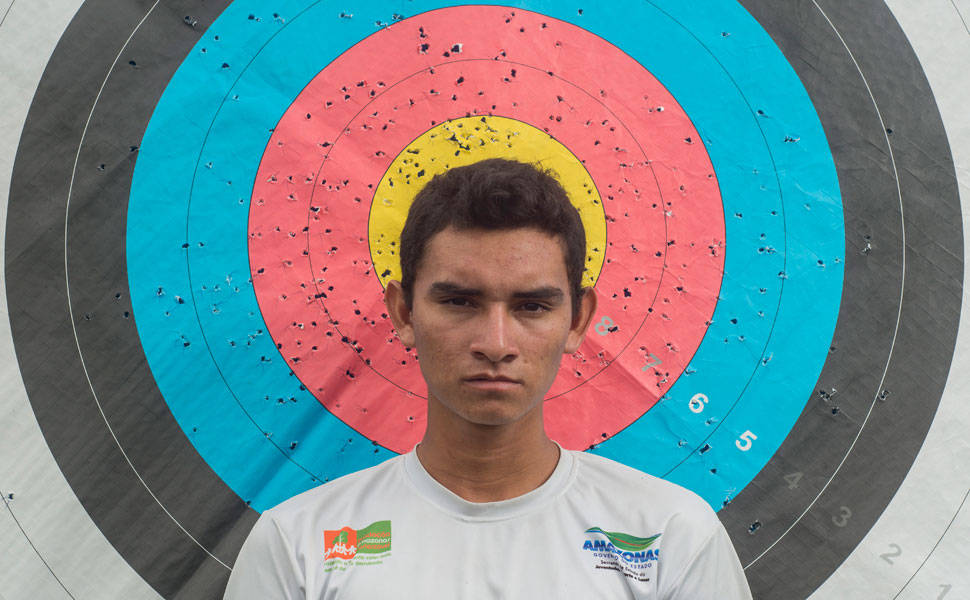Latest Photo Galleries
Brazilian Markets
17h38 Bovespa |
+0,02% | 124.196 |
16h43 Gold |
0,00% | 117 |
17h00 Dollar |
+0,15% | 5,2507 |
16h30 Euro |
+0,49% | 2,65250 |
ADVERTISING
Athlete Dreams of Becoming the First Native Brazilian to Represent the Country in the Olympics
03/30/2015 - 09h49
Advertising
MARIANA LAJOLO
FROM MARICÁ (RJ)
Through the window of the small wooden house that he shared with his parents and his three brothers, Iagoara could see his yard. The trees of the Amazon forest and the water of the river comprised the site where the young Kambeba Native Brazilian used to play. The tribe's young boys had fun running, climbing trees, hunting, swimming and fishing - the tribe is in a protected area on the Negro river, four hours by boat from Manaus.
He used to fish using a bow and arrow. He got his first bow from his father. At the age of nine, he made another one with his own hands. He was known for his skill and his aim. "I learned by myself. In the tribe, we used to choose targets and hold competitions. Once I was fishing with my grandmother and I caught two fish with one arrow," he says.
The game became a serious activity. Iagoara, the Native Brazilian name of Dream Braga Silva, 18, could become the first Native Brazilian to represent the country in the Olympic Games to be held in Rio de Janeiro in 2016. He has been a permanent member of the Brazilian nation archery team since January.
In 2013, young members of his tribe participated in a selection process held by Fundação Amazonas Sustentável (FAS), an NGO that works with social and educational projects in Amazonas. The idea is to find talents and take them to practice in the Olympic Village in Manaus.
"I wanted to find a way to connect the Amazon and the Olympics. Then I had the idea of the archery competitions, which supports tradition and, at the same time, gives a chance to the young Native Brazilian people," says forest engineer Virgílio Viana, a superintendent at FAS.
Viana says that "the Native Brazilians' lack of hope is evident." Between 2002 and 2012, 20.9% of the suicides in Amazonas were committed by Native Brazilians, which represents only 2.9% of the state's population. They suffer with the difficulties to adapt in bigger cities and the lack of opportunities. Some of the most common problems are alcoholism, depression and prostitution.
TRANSLATING THE OLYMPICS
To find athletes among the members of the tribe, physical education teacher Márcia Lot tested 328 teenagers between the ages 14 and 19 of 29 ethnic groups. She also followed the Games of the Indigenous People, an annual competition organized with the support of the Sports Ministry.
"I took movies about the Olympic Games so that they could understand what the competition was. I had to explain what we wanted to the chief and to the shaman. Sometimes there was no translator. And some mothers didn't let their children come to Manaus with us," says Lot.
Dream was the first to win one of the competitions. His brothers, Deivid, Deusineide and Riquelme were not selected. "I didn't know that archery was a sport or what the Olympic Games were," says Dream.
Encouraged by his parents, he moved to Manaus at the beginning of 2014. He had never seen an Olympic bow before.
The toy he used to fish on the Negro river weighed only 500 grams. The Olympic bow weighs three kilos. The new instrument also had an aiming device and protection for the arms and fingers. Dream adapted to the new equipment quickly. In his first Brazilian championship, he finished third and drew the attention of Italian coach Renzo Ruele. Dream was invited to an internship on the national team in Maricá, Rio de Janeiro. He was called to the team less than a month later.
"In Manaus, I used to visit my family when I missed them. I didn't want to stay when I first arrived in Maricá because I was very homesick. But now I've got used to it now," he says.
He lives at the Brazilian Archery Confederation's training center which looks like a country house, where the only sounds are the birds singing and arrows flying through the air. He practices for some five hours a day.
"In the tribe, we used to run, play soccer, and play with our friends. But it's different here. It's necessary to be very dedicated to become a top athlete."
Dream has already taken part in a competition to participate in a tournament in Santo Domingo, in the Dominican Republic. There were two positions and he finished third. In April, he will try to compete in the Youth World Archery competition, for athletes under 19.
Reaching the Olympics is still a dream. And the way is difficult. Brazil will have a team with three archers. Dream has to be among the country's three best archers before the athletes for the 2016 Olympic Games are chosen.
The serious and committed teenager resembles a young boy when he speaks of the joy of having gone to Rio de Janeiro and visited the Sambadrome. "I used to watch the Carnival parades on TV every year. I had always wanted to visit the Marquês de Sapucaí."
That is where he can hold his bow in 2016 to become the first Native Brazilian to represent the country in the Olympic Games.
Translated by THOMAS MUELLO




